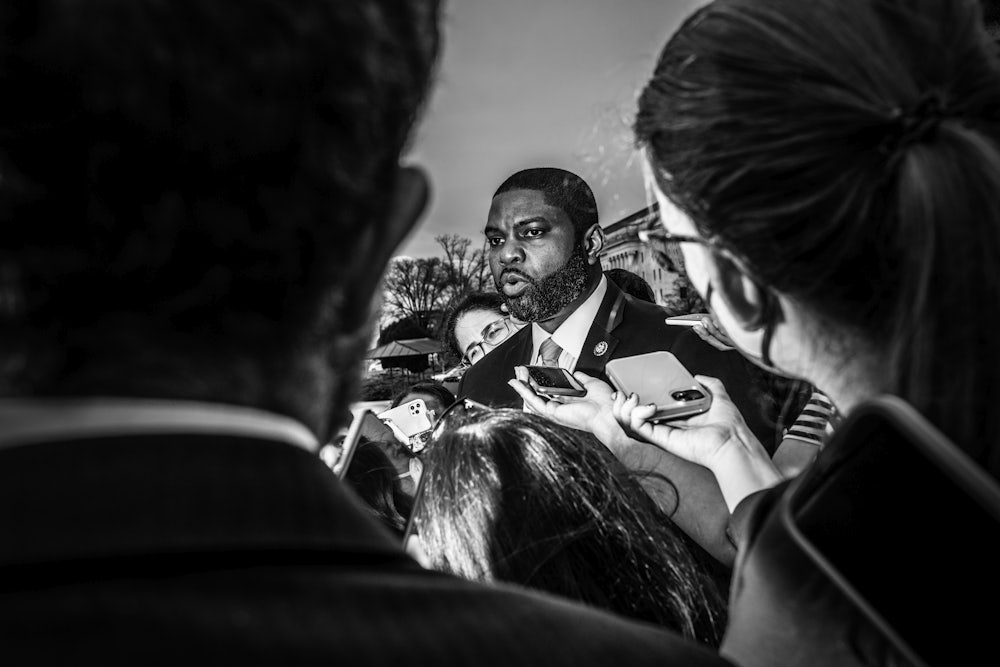I first encountered Florida Representative Byron Donalds in a small conference room at CPAC Dallas back in August 2022. He stood alongside his wife, Erika, who told an audience of perhaps 150 people the story of their middle child, Darin, who did not do well in traditional school but now thrives at a small private school able to give him the individualized attention he needs. “In the United States today, [school choice] is frankly only preserved for the rich and people in the upper middle class,” Byron Donalds commented.
The Donaldses’ policy prescription—get involved with your school board, promote school vouchers—fit with the themes of the conference. The social justice argument did not. The moment stuck with me even as much else about the frenetic three-day event faded from memory.
I next encountered Donalds midway through Kevin McCarthy’s interminable January struggle to coax and bribe his way into enough votes to become the GOP’s new House speaker, when Texas Representative and anti-McCarthyite Chip Roy unexpectedly nominated Donalds as the holdouts’ preferred speaker candidate. “For the first time in history,” Roy proclaimed, “there have been two Black Americans placed into the nomination for speaker of the House.” Donalds got 20 votes during that roll call.
Roy’s line earned a reluctant standing ovation inside the chamber and vitriol outside it. “Byron Donalds is not a historic candidate for speaker. He is a prop,” Democratic Representative Cori Bush tweeted furiously. “Despite being Black, he supports a policy agenda intent on upholding and perpetuating white supremacy.” A few days later, MSNBC anchor Joy Reid wrote off the Donalds nomination as a “diversity statement.”
After extensive negotiations, Donalds eventually ended the saga and, along with most of the other objectors, voted for McCarthy. The move paid off. This no-name Florida member of the House with just one term under his belt landed himself a plum position on the House Republican Steering Committee, which determines who gets assigned to all the other committees. Donalds’s star is rising, and his ability to meld the staunch conservative politics of the anti-McCarthy faction with a softer, almost progressive tone of rhetoric seems likely to take him even higher.
Donalds does not look like the other Freedom Caucus members—he is the only Black person associated with the group—and his speeches do not usually sound like the fire-breathing exhortations of the other caucus members either. Take guns. “Who do you think you are to disarm Americans and leave them vulnerable?” Lauren Boebert shrieked in early 2021, during a floor debate on enhanced background checks. “You want to defund our police and yet leave us without a way to protect ourselves!” Donalds, by contrast, has managed to maintain his A+ NRA rating without sounding heartless. “Gun crime in the United States is a tragedy for us all,” he said later in the session. “Unfortunately, laws don’t fix most of the tragedies that we face as Americans,” he said, adding that we should not be “stripping the constitutional rights from our fellow citizens.”
Donalds often uses the language of social justice to advance a fiscal agenda ripped from the pages of Atlas Shrugged. “If you want to see, frankly, Black families or Hispanic families lose jobs or get paid less money, raise the corporate income tax,” Donalds admonished during a news conference in May 2021. “Those families will see less money going into their home, going into their pocketbooks, to pay for food, to pay for their children’s needs.”
The following year, Donalds argued that regulation as a whole runs counter to social justice. “We all know the history,” he said. “We understand why there are Black families who do not have the same size of net worth as white families on an average basis. But what you do not do is saddle our economy with more regulation and more silly policies.”
The use of social justice rhetoric to argue against social justice policy might seem like cynical, pick-me nonsense to most left-of-centers, but the world is not so simple. Donalds does not believe that systemic racism exists. He believes that laissez-faire capitalism will allow minorities to succeed, and that the best thing the government can do for Black people is get the hell out of their way.
After all, that’s how things worked out for him.
Donalds was born to a single mother in 1978 and grew up in Crown Heights, a Brooklyn neighborhood then rife with poverty and torn by racial tension. In fifth grade, he was mugged on his way to school; at 16, he was held up at gunpoint. His mother likely made good money as a hospital trauma coordinator, but with three children to care for, money was always tight.
As a child, Donalds was a handful: the kind of kid who disassembles and reassembles clocks for fun, the kind of kid who gets bored in school and acts out. When he was in first grade, educators suggested Ritalin for him, but his mother opted for a mental stimulant instead. Sending Donalds to private school was an enormous sacrifice, but one she willingly made. When she lost her job, his grandmother stepped in to pick up the slack.
Sacrifice was a two-way street. Donalds’s high school life consisted of school, sports, and little else. His social circle was small and he skipped out on prom. But his hard work paid off. At 18, he boarded a Greyhound and headed for Florida A&M.
The transition from his mother’s strict household to the total freedom of college proved difficult. A few months after his arrival, Donalds was arrested for possession of marijuana. Two years later, he found himself in trouble with the law again, this time for depositing a bad check. It was an act of desperation, he says: During this period, Donalds largely survived by selling plasma, working odd jobs, and begging his mom for money. His GPA dropped. His bright future, bought so dearly, seemed on the verge of burning out.
In his third year of college, Donalds realized he had to turn his life around. When he learned he could transfer his credits to Florida State University but leave his GPA behind, he jumped at the opportunity. He joined a business fraternity and met a woman named Erika, who invited him to visit her church. He accepted, and within those walls found the purpose he’d been searching for. The experience led, indirectly, to Donalds pledging his life to Christ in a Cracker Barrel parking lot during an unauthorized shift break. Donalds graduated from FSU with degrees in marketing and finance and a serious relationship. Two years after Erika took him to church, Byron took her back there, and the pair were married in 2003.
Erika and Byron found high-paying jobs in the finance sector, settled down in Naples, and had three children. Through God, hard work, and a good private school education, the kid from Brooklyn had achieved the American dream. Translating those ideas into political action didn’t begin until 2008, when the financial crash hit. “I turned on the House Financial Services Committee one day, and I was pissed,” he told The Daily Signal. “I was like, ‘Who are these people? They don’t know what they’re talking about.’”
Cable news pundits didn’t seem to know what they were talking about either. A friend advised listening to Mark Levin, a radio talk show host whom Sean Hannity calls “The Great One” and Rolling Stone’s Peter Wade called “a bomb-throwing Trump sycophant.” The more Donalds listened, the more sense Levin made. He began to read books Levin recommended: Bastiat, Locke, Montesquieu. He changed his voting registration to Republican, threw in with the Tea Party, and never looked back.
As the Tea Party rose in prominence and influence, Byron and Erika Donalds did, too. She joined multiple organizations. He joined a Toastmasters group in Naples and began to speak at rallies, where local conservative radio host Bob Harden first encountered the couple. “He was just terrific,” Harden told me. “He’s able to have conversations with and discuss issues with the ‘other side’ that many people can’t pull off.”
Inspired by the grassroots DIY ethos of the movement, Byron decided to make a run at the House in 2012. He finished just fifth out of six primary candidates but maintained his new political connections. In 2014, Governor Rick Scott appointed Donalds to the board of Florida SouthWestern State College. When Donald Trump rallied in Florida, Byron secured a speaking slot.
In 2016, Byron Donalds ran for office again, this time for the Florida state legislature. Erika was serving on their local school board. Both had no trouble getting elected, and from their respective positions launched a multipronged campaign to advance God, hard work, and a private education for Florida’s children.
Byron sponsored a bill that would allow any community member to object to any part of the public school curriculum. After the bill passed, Erika listened patiently alongside her fellow school board members as citizens presented those objections. Many belonged to the Florida Citizens Alliance, or FLCA, and came armed with concerns over textbooks that contain “left-leaning propaganda” or “[indoctrinate] our children to become future social justice warriors.” None of these complaints likely came as a surprise to Erika Donalds—she was a founding member of the Southwestern chapter of the FLCA.
Erika wasn’t alone. Many other members of the recently formed Florida Coalition of School Board Members had deep ties to Tea Party politics. Other members included Bridget Ziegler and Tina Descovich, who would go on to found Moms for Liberty in early 2021 and terrorize school boards across the country. Erika Donalds currently serves on the organization’s advisory board.
Back in the state legislature, Byron worked to expand school choice. In 2017, he helped pass the “Schools of Hope’’ initiative, which created a category of charter school with a streamlined approval process—less oversight with regard to curriculum and quality of instruction. “The Schools of Hope program goes to help kids who look like me,” he said. In 2020, he helped expand Florida’s school voucher program by $200 million. Both programs divert money away from public schools, which must then continue to operate on a vastly reduced budget.
Sue Legg, a member of the board for the Network for Public Education, agreed that the system is rigged. But vouchers, she said, do not solve the problem. The approximately $7,700 every child in Florida is eligible for each year is not enough to pay for an elite private school, and many do not accept vouchers anyway.
Affordable private options tend to be religious. In 2017, over 80 percent of voucher recipients used them to attend a religious school. Private schools do not undergo the same rigorous testing or monitoring that public schools do, nor can taxpayers formally object to their curricula. An Orlando Sentinel investigation found that these curricula have included things like teaching that humans and dinosaurs once lived together, or that “most black and white southerners had long lived together in harmony” in the antebellum South.
These retrograde beliefs were not confined to the history classroom. Another Sentinel investigation found that, in 2019, vouchers for over 20,800 students went to private schools with overtly anti-gay agendas. Seventy-three of those schools explicitly taught that being gay or transgender is a biblical sin.
Just before leaving the Florida legislature to move up to the national one, Donalds co-sponsored three bills that aligned with these views. One created a legal loophole for gay conversion therapy. Another walked back anti-discrimination protections for LGBTQ employees. The third made providing gender-affirming care to minors a criminal offense with a penalty of up to 15 years in prison. None of the bills passed, but the message was unmistakable.
Donalds does not indulge in histrionic speeches about mutilation and castrated children. He rarely brings up the issue at all, unless he’s at a conservative event speaking to a conservative audience, and even then only briefly. “My mom would have never let anybody talk to me about gender identity,” Donalds told his audience at a 2022 Faith and Freedom conference—a line he uses often at events like this. Sometimes, though, you can learn more about someone from whom they sit with than from what they say. Katherine Stewart, a reporter who covered the conference, pointed out that the panel moderator praised Donalds for “enforcing the Seven Mountains of Influence”—an allusion to the Dominionist-adjacent belief that Christians must control every area of life to prepare for Christ’s return. And a few minutes before Donalds spoke, the panelist next to him had exhorted any vaccinated audience members to “pray and repent and ask God to change back your DNA.”
Byron Donalds does not talk about school choice very much anymore. His 2020 campaign website barely mentioned education policy. For the last two years, Donalds has primarily focused on financial issues, even as his wife and her associates in Moms for Liberty helped transform the issue of public school “groomers” into the major battlefield of the culture wars.
Whatever his reasons for neglecting the cause he spent the last decade of his life advancing, his actions in Florida continue to bear fruit. They are his résumé, a testimony to his political acumen and an answer to furious questions, like the two from Joy Reid below, that were slung at him in the aftermath of the speaker fight.
What were your qualifications to be speaker of the House?
On January 18, the Florida State Board of Education ruled that books in classroom libraries must be “approved and selected by a media specialist.” Florida children returned to school after winter break to bare bookshelves, or to shelves covered with butcher paper to protect the students from potentially dangerous material. The very next day, Florida legislators filed a bill that would expand Florida’s school voucher program to cover every Florida student, regardless of income.
What is the job of speaker? Can you explain what the job of speaker is?
Byron Donalds did not become speaker—was never going to become speaker—but he walked away from that fight a winner. Rumor has it the sophomore representative already has his eye on a larger prize. A Ron DeSantis presidential run would leave a vacancy in the Florida governor’s mansion. Donalds just might be the man to fill it.
Donalds is far more than a diversity statement. He is a hard-line Christian conservative, but one you can take home to your mostly secular mother. The congressman is no prop. Dismiss him at your peril.




